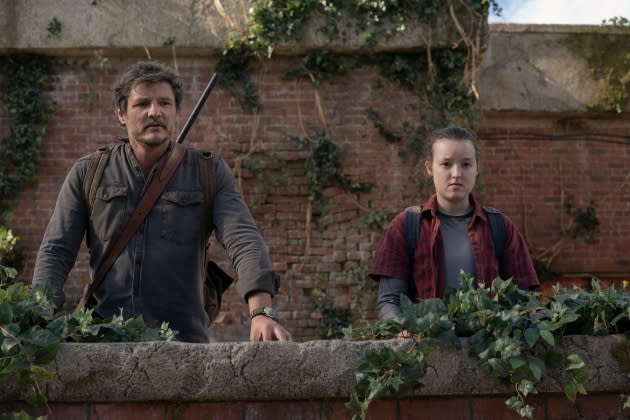‘The Last of Us’ Delivers a Heartbreaking Season Finale
- Oops!Something went wrong.Please try again later.

THIS POST CONTAINS spoilers for this week’s episode of The Last of Us, “Look for the Light.”
As we come to the end of an utterly fantastic debut season of television, it’s worth looking back to note that of these nine episodes, only three of them (the premiere, “Infected,” and “Endure and Survive”) featured lots of infected, several others didn’t include them at all, while the rest only had one or two of the creatures, and usually briefly, at that. For all that the creators of zombie shows and movies talk the “We’re trying to show that human beings are the true monsters” talk, very few of them have walked the walk like this zombie-adjacent series. The infected are dangerous obstacles, but they are in no way what The Last of Us is about. Craig Mazin, Neil Druckmann, and everyone else involved have put in the work to make this a show about people, and Pedro Pascal and Bella Ramsey have made them into people whom viewers can give their whole hearts.
More from Rolling Stone
Pedro Pascal Considers Biting Into Someone's Flesh on 'Hot Ones'
'The Mandalorian' Kicks Into High Gear Thanks to Katee Sackhoff's Bo-Katan
Or, in the case of the climax of Season One, they’ve made them into people whose actions can utterly break our hearts.
If the underlying theme of these stories — including the ones being told in prior weeks — is about how the overwhelming fear and paranoia of post-apocalyptic life can make monsters out of any of us, then “Look for the Light” chooses to focus on a different emotion: love. The hour is bookended by two of Ellie’s parental figures — her biological mother Anna(*), and her surrogate father Joel — making bold decisions out of their desire to save this girl. But the ramifications of each choice couldn’t be more different. Anna dooms only herself for the daughter she’ll never get to know, while Joel dooms the entire human race, partly for Ellie, partly for the daughter he lost 20 years before. Love is usually a wonderful thing, but it can make monsters of us as easily as the more negative emotions.
(*) Anna is played by Ashley Johnson, who played Ellie in the game. At this point, if W. Earl Brown (aka Bill in the game) doesn’t have a notable guest appearance in Season Two, I will be very disappointed.
After the prologue depicting the day and night of Ellie’s birth, and the complete fluke of timing that ultimately rendered her immune to Cordyceps, we return to 2023, several months after the events of “When We Are in Need.” The snow has melted, and the spring countryside is just lovely, even before our heroes stumble across a herd of giraffes on their travels. With the change of season is also a significant change in the pair’s dynamic. Now Ellie, still traumatized over what David did to her, is the one who’s emotionally closed-off and taciturn, while Joel has become the chatterbox. It’s his gentle attempt to draw Ellie out of the shell she built around herself following David’s assault, but also a sign of how far he has come psychologically since they met in Boston.
Joel is feeling so open, in fact — or, perhaps, so concerned for Ellie’s well-being that he is willing to sacrifice his privacy — that he finally explains the rest of the anecdote about the time someone shot at him and missed. The shooter? Joel himself, in a fit of suicidal ideation shortly after Sarah’s death. He admits he still doesn’t know why he flinched at the last moment, but it has finally worked out for him, allowing him to stay alive long enough to meet this wonderful kid and become her protector. Ellie suggests that the moral of his story is that time heals all wounds, but Joel replies — with Pascal’s voice breaking in an utterly beautiful and devastating manner — “It wasn’t time that did it.” For 20 years, he existed just to exist, and while he could feel affection for people like Tess, Tommy, and Frank, those feelings could never overpower the grief that lingered deep inside him. Ellie, though, has brought him back to life, and in the process become his entire reason for being. No matter how much the two of them have grown to love one another, this is in no way a healthy dynamic, as we see in the season’s utterly brutal climax.
Moments after the discussion of Joel’s suicide attempt, the two finally cross paths with the Fireflies, who don’t initially recognize them and pistol-whip Joel into unconsciousness. When he awakens, Marlene is there to explain how the cure will work, which makes Joel realize that the only way to synthesize it is to kill Ellie and cut open her brain. Marlene is betraying both Joel and Anna, since she promised she would protect Ellie no matter what, but it’s with a higher purpose in mind. Ellie’s condition is a one-in-a-billion shot that would be nearly impossible to replicate — and only if you were willing to murder a whole bunch of new mothers (and potentially their newborn children) in the attempt. If there is a realistic hope of a vaccine that will safeguard future generations from infection, it has to happen here and now, and Ellie has to die in the process.
It is not a decision on which Ellie is consulted, but it is one where she probably would have concurred with Marlene. While en route to the hospital, Joel suggests they just go back to Tommy and spend their days in the relative safety of Jackson. Ellie, though, says that all the tragedy they’ve witnessed and experienced has to have been for something, insisting, “There’s no halfway with this. We finish what we started.”
But if Marlene doesn’t give Ellie a choice, neither does Joel. While being escorted out of the building by Marlene’s people, he once again demonstrates his incredible facility with violence, killing his captors and setting out to save Ellie by any means necessary. For the first time in many episodes, it feels like we are watching someone play through the video game, as Joel kills one person after another as he moves down corridors, up and down stairwells, and eventually into the surgical suite where the doctor is preparing to operate on Ellie. Many of these people are a threat to him and the mission he has taken on, but he also kills people who have surrendered to him.

Even if you believe that the fate of the world is not worth the death of one person, even if you have developed such affection for Ellie that you cannot stand the idea of her dying after only a single season, and even if you love the game and/or violent action sequences, it is hard to watch Joel’s rampage and feel anything but sick. It very quickly goes from a father doing whatever it takes to rescue his daughter, to an unhealthy man exorcising decades-old demons by killing the hell out of anyone unfortunate enough to cross his path.
My understanding is that the game does not offer players the option to have Joel stand down and let the doctor synthesize the cure. No matter what else happens, you-as-Joel have to save her, and have to kill everyone trying to interfere with that mission. And by this point in the season, it is clear that Joel doesn’t have any other choice, either. Circumstances have forged him into a person who will always do anything he can to protect Ellie, regardless of the consequences — or, for that matter, regardless of what she might want. Because the girl who wanted to see this through no matter what — who seems so obviously troubled by her suspicion that Joel is lying to her about what happened while she was unconscious — is someone who, at minimum, would have considered giving up her life to preserve that of so many others. Marlene took that choice from her, but so did Joel.
It’s a fascinating inflection point on which to conclude the season. (And, I suppose, the game, since the season covers its entire plot.) There is certainly a version of the story that could have continued where the cure was obtained without killing Ellie. Given the state of the world, it would take many years to immunize everyone left around the globe, and there would still be the matter of dealing with all the infected(*). And as we’ve witnessed, the series has done just fine for itself focusing on what life would be like in this reality, even when there are no mushroom zombies ambling into frame. There could have been no lack of tension and action for many seasons to come this way.
(*) The frequent use of “cure” implies that perhaps some of the infected could be restored to normal. (Maybe not the giant mushroom man from Kansas City.) But even if that’s the case, good luck safely treating each one while they try to rip your throat open.
Instead, Joel has taken away all hope for the future as a way of working through his guilt over failing to save Sarah, and out of the love he has grown to feel for Ellie. Maybe he was right to do it. Maybe saving the world isn’t worth sacrificing an innocent girl. Maybe lying to Ellie is the only fair thing to do, so she won’t spend the rest of her life shouldering the guilt of failing humanity in this crucial moment. But the way so many of Joel and Ellie’s interactions in this episode go — in particular their final conversation before heading into Jackson — it’s hard not to picture their relationship disintegrating in a hurry the moment she finds out the truth.
Is there a long-running series in that conflict? I don’t know, and I also know nothing about the second game, including whether there’s enough story there to fill more than a single season. But there’s a moment where Ellie and Joel are admiring the giraffes, and he asks her, “So, is it everything you’ve hoped for?” Whether the series has lived up to the expectations of the game’s fans, The Last of Us sure exceeded all of my expectations. We’ll see it again soon, I hope.
Best of Rolling Stone

